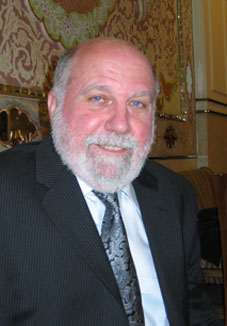 Dr. Peter Harry Rist has been jury member of the Asian cinema competition section of Fajr International Film Festival. He has been teaching history and aesthetics at Mel Hoppenheim School of Cinema at Concordia University in Montreal, Canada since 1989. He is now the dean of cinema school of that university. Born in England in 1943, he has got his Ph.D. in cinema from New York University. He has carried out extensive research on cinemas of such countries as Brazil, Cuba, Korea, China, and Hong Kong and his papers have been published in various international periodicals including CineAction, Cinemaya, Asian Cinema (Journal of Asian Cinema Studies Society), Sequences, 24 Images, and the English series, 24 Frames. He is also the author of South American Cinema: A Critical Filmography and Guide to the Cinema(s) of Canada. Mr. Rist was in Tehran in February as guest and jury member of the Asian cinema competition section of the 26th Fajr International Film Festival. In the following interview, he has given his opinion about the Iranian cinema.
Dr. Peter Harry Rist has been jury member of the Asian cinema competition section of Fajr International Film Festival. He has been teaching history and aesthetics at Mel Hoppenheim School of Cinema at Concordia University in Montreal, Canada since 1989. He is now the dean of cinema school of that university. Born in England in 1943, he has got his Ph.D. in cinema from New York University. He has carried out extensive research on cinemas of such countries as Brazil, Cuba, Korea, China, and Hong Kong and his papers have been published in various international periodicals including CineAction, Cinemaya, Asian Cinema (Journal of Asian Cinema Studies Society), Sequences, 24 Images, and the English series, 24 Frames. He is also the author of South American Cinema: A Critical Filmography and Guide to the Cinema(s) of Canada. Mr. Rist was in Tehran in February as guest and jury member of the Asian cinema competition section of the 26th Fajr International Film Festival. In the following interview, he has given his opinion about the Iranian cinema.
Film International: How did you see Fajr International Film Festival compared to other film festivals you have already attended?
Peter Rist: Since I was on the jury, I saw it very differently from other festivals because I did not attend the public screenings. I was only present in private screenings for jury members as well as more general screenings of the Iranian films (which included simultaneous translation into English for the guests). The only public event I witnessed was the press conference of the Asian cinema jury. I was extremely impressed when I noticed that everybody was interested in listening to what a jury member had to say. This was my sole confrontation with Iranians’ enthusiasm for cinema, which I had already seen through Makhmalbaf's Salam Cinema.
FI: Have you seen any special film in the festival (whether Iranian or non-Iranian) that impressed you?
PR: The best film I saw was As Simple as This. I found out that identification with the female character of the film grew as the story unfolded. It was a real achievement for screenwriters and director who managed to get the audience engaged in such a simple story. Unlike its name, the film was not “simple” at all. I was also touched by performance of the main characters for whom the film was a debut. I also saw the Hong Kong film, An Eye in the Sky for the second time and I found it an excellent thriller – far superior to Hollywood or U.S. TV versions – which employs a viewpoint-based structure in a brilliant way. I also really admire the Korean film, Family Ties (which was not liked by other jury members) for its brilliant narrative structure. In this film, three seemingly unrelated stories are surprisingly linked to each other, thus bringing two generations of two eccentric families close together. It is perhaps the most remarkable example I've seen of what David Bordwell calls "network narrative"....
SUBSCRIBE

